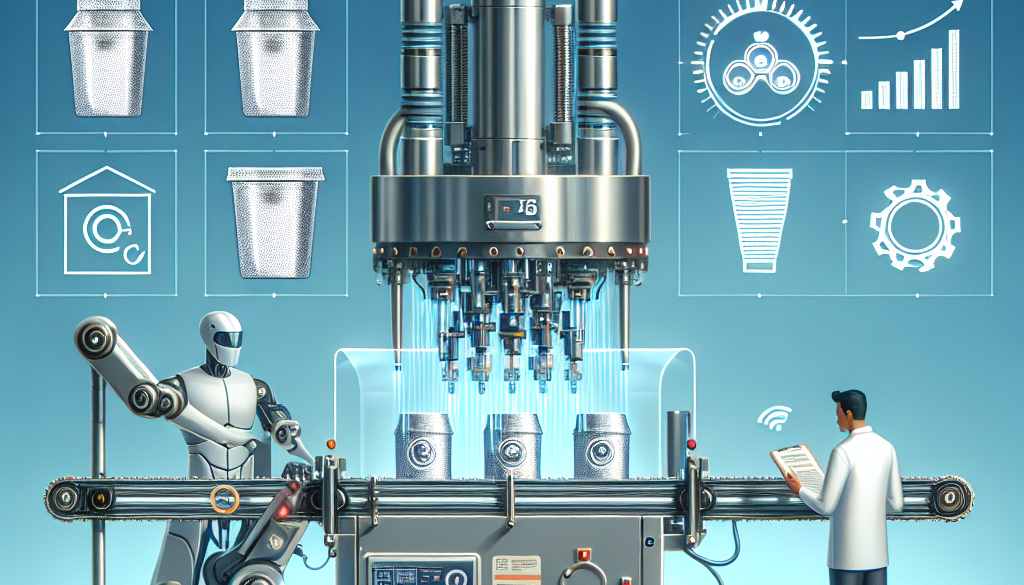Packaging Technology Innovations in the Food Industry
-
Table of Contents
- Packaging Technology Innovations Transforming the Food Industry
- Smart Packaging: Enhancing Consumer Engagement and Food Safety
- Biodegradable and Edible Packaging: A Step Towards Sustainability
- Active Packaging: Extending Shelf Life and Maintaining Quality
- Recyclable and Reusable Packaging: Closing the Loop
- Personalized Packaging: Meeting Individual Consumer Needs
- Conclusion: The Future of Food Packaging is Bright and Innovative
- ETprotein: Your Partner for High-Quality Protein Products
Packaging Technology Innovations Transforming the Food Industry

The food industry is a dynamic and ever-evolving sector, with packaging playing a crucial role in ensuring food safety, extending shelf life, and enhancing consumer convenience. As consumer preferences shift towards sustainability and technology continues to advance, the food packaging sector is witnessing a wave of innovations that are set to redefine the market. This article delves into the latest packaging technology innovations that are making waves in the food industry.
Smart Packaging: Enhancing Consumer Engagement and Food Safety
Smart packaging is a groundbreaking innovation that incorporates functionalities beyond the conventional containment and protection of products. It includes features such as freshness indicators, temperature monitors, and interactive labels that engage consumers and provide valuable information about the product’s condition.
- QR Codes and NFC Technology: Quick Response (QR) codes and Near Field Communication (NFC) tags on packaging allow consumers to access detailed product information, traceability data, and promotional content by simply scanning with their smartphones.
- Time-Temperature Indicators: These indicators provide visual cues about the product’s exposure to temperatures over time, ensuring consumers can assess the freshness and safety of perishable goods.
Biodegradable and Edible Packaging: A Step Towards Sustainability
With the increasing awareness of environmental issues, biodegradable and edible packaging solutions are gaining popularity. These innovations aim to reduce the environmental impact of packaging waste by using materials that can decompose naturally or be consumed along with the product.
- Plant-Based Materials: Packaging made from cornstarch, mushroom roots, and seaweed are examples of biodegradable options that break down without leaving harmful residues.
- Edible Films and Coatings: Edible packaging made from proteins, lipids, or carbohydrates can serve as a barrier to moisture and oxygen, extending the shelf life of food while being safe to consume.
Active Packaging: Extending Shelf Life and Maintaining Quality
Active packaging systems are designed to interact with the food product or the environment inside the packaging to maintain or extend the product’s freshness and shelf life. These systems can absorb or release substances to preserve the quality of the food.
- Oxygen Scavengers: These additives remove oxygen from the packaging, preventing oxidation and spoilage of oxygen-sensitive products.
- Moisture Control: Desiccants or moisture absorbers help maintain the optimal humidity level inside the package, crucial for dry goods like snacks and cereals.
Recyclable and Reusable Packaging: Closing the Loop
Recyclable and reusable packaging solutions are essential for creating a circular economy where materials are kept in use for as long as possible. Innovations in this area focus on designing packaging that can be easily recycled or repurposed.
- Monomaterial Packaging: Packaging made from a single type of material is easier to recycle, reducing contamination and improving the efficiency of recycling processes.
- Reusable Containers: Reusable packaging systems, such as glass jars or silicone bags, encourage consumers to reduce waste by refilling and reusing containers.
Personalized Packaging: Meeting Individual Consumer Needs
Advancements in digital printing technology have made it possible to create personalized packaging that caters to individual preferences and dietary requirements. This trend is particularly relevant in the context of e-commerce and subscription-based food services.
- Digital Printing: High-quality digital printing allows for small batch customization, enabling brands to offer personalized designs or messages on their packaging.
- Customized Nutritional Information: Packaging that includes personalized nutritional information based on consumer health profiles or dietary restrictions is becoming more common.
Conclusion: The Future of Food Packaging is Bright and Innovative
The food industry is at the forefront of packaging innovation, with technology playing a pivotal role in addressing consumer demands for safety, sustainability, and convenience. Smart packaging enhances consumer engagement, while biodegradable and edible options offer eco-friendly alternatives. Active packaging technologies extend the shelf life of food products, and recyclable and reusable solutions contribute to a more sustainable future. Personalized packaging, on the other hand, caters to the unique needs of individual consumers. These innovations are not only transforming the food industry but also setting new standards for packaging across all sectors.
ETprotein: Your Partner for High-Quality Protein Products
In line with the latest packaging technology innovations, ETprotein is committed to providing high-quality protein products that meet the evolving needs of the food industry. Their extensive range of organic bulk vegan proteins and L-(+)-Ergothioneine (EGT) products are packaged with the utmost care to ensure freshness, quality, and consumer satisfaction. Whether you’re looking for plant-based protein options or specialized ingredients for your food products, ETprotein has the solutions to support your business’s growth and success.
About ETprotein:
ETprotein, a reputable protein and L-(+)-Ergothioneine (EGT) Chinese factory manufacturer and supplier, is renowned for producing, stocking, exporting, and delivering the highest quality organic bulk vegan proteins and L-(+)-Ergothioneine. They include Organic rice protein, clear rice protein, pea protein, clear pea protein, watermelon seed protein, pumpkin seed protein, sunflower seed protein, mung bean protein, peanut protein, and L-(+)-Ergothioneine EGT Pharmaceutical grade, L-(+)-Ergothioneine EGT food grade, L-(+)-Ergothioneine EGT cosmetic grade, L-(+)-Ergothioneine EGT reference grade and L-(+)-Ergothioneine EGT standard. Their offerings, characterized by a neutral taste, non-GMO, allergen-free attributes, with L-(+)-Ergothioneine purity over 98%, 99%, cater to a diverse range of industries. They serve nutraceutical, pharmaceutical, cosmeceutical, veterinary, as well as food and beverage finished product distributors, traders, and manufacturers across Europe, USA, Canada, Australia, Thailand, Japan, Korea, Brazil, and Chile, among others.
ETprotein specialization includes exporting and delivering tailor-made protein powder and finished nutritional supplements. Their extensive product range covers sectors like Food and Beverage, Sports Nutrition, Weight Management, Dietary Supplements, Health and Wellness Products, and Infant Formula, ensuring comprehensive solutions to meet all your protein needs.
As a trusted company by leading global food and beverage brands and Fortune 500 companies, ETprotein reinforces China’s reputation in the global arena. For more information or to sample their products, please contact them and email sales(at)ETprotein.com today.












